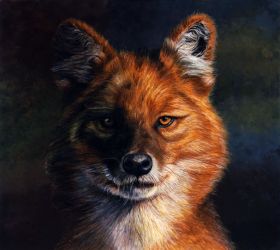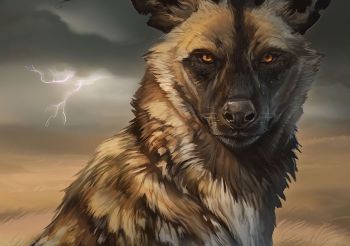Difference between revisions of "Dog (wild)"
Tao alexis (talk | contribs) |
Tao alexis (talk | contribs) (→Dhole) |
||
| Line 44: | Line 44: | ||
They are highly social. They typically live in a simple earth den, which they will steal from other creatures or re-use from earlier migrations. As a clan, they have no dominance rituals. The dhole usually hunt in groups of 3-5 animals, joining together as a clan during reproduction or during migrations. | They are highly social. They typically live in a simple earth den, which they will steal from other creatures or re-use from earlier migrations. As a clan, they have no dominance rituals. The dhole usually hunt in groups of 3-5 animals, joining together as a clan during reproduction or during migrations. | ||
| − | The dhole are not territorial; instead, they will migrate distances of hundreds of miles before moving into a new area. During this migration they will lose several pounds from starvation, which causes them to engage and hunt aggressively when resettling; this sometimes results in "overhunting," in which the dhole will kill more than they can eat. Some villagers welcome the return of the dhole because of this opportunity for easy meat. | + | The dhole are not territorial; instead, they will migrate distances of hundreds of miles before moving into a new area. During this migration they will lose several pounds from starvation, which causes them to engage and hunt aggressively when resettling; this sometimes results in "overhunting," in which the dhole will kill more than they can eat. Some villagers welcome the return of the dhole because of this opportunity for easy meat. |
| + | |||
| + | However, dhole have been known to hunt domestic livestock. They can chase their prey for a dozen hours if hungry. A famous legend tells of numbers of dhole treeing tigers and keeping them there until the tiger tires and falls prey. | ||
=== Throat Attack === | === Throat Attack === | ||
Revision as of 19:44, 10 April 2021
| Type | Dhole | Wild African Dog |
| Species | canine | |
| No. Appearing | 5-20 | 4-24 |
| Behaviour | social (clan) | social (pack) |
| Range | barrens, jungle, rainforest, savanna, steppe, woodland |
desert, savanna |
| Size | 17 to 22 in. tall | 24 to 30 in. tall |
| Weight | 22 to 46 lbs. | 40 to 79 lbs. |
| Intelligence | 4 | 3 to 4 |
| Armour Class | 7 | 7 |
| Hit Dice | 2 | 2 |
| Action Points | 5 | 5 |
| Max. Stride | 17 | 26 |
| THAC0 | 20 | 20 |
| Hp/Die | d3 (d4) | d4 (d6) |
| Attack Form | bite | |
| Damage | 1-4 | 1-6 |
| Special Attack | throat attack | |
Wild Dog is a term broadly applied to canines that are either African in origin ("wild African dog") or Asiatic ("dhole"). Dogs that are feral, meaning formerly domesticated who have reverted to the wild, should be treated as domestic dogs.
Dhole
The dhole are the smaller of the two, being "cat-like" on account of its long backbone and slender limbs. It has a wide skull and is considered to be the more intelligent species. The general tone of the fur is reddish, which grows dull in winter or rainy months. The dhole are remarkably common in both the lowlands and highlands of Central Asia, Tibet, Mongolia and India, reaching as far east as Korea. Dhole cannot be tamed.
They are highly social. They typically live in a simple earth den, which they will steal from other creatures or re-use from earlier migrations. As a clan, they have no dominance rituals. The dhole usually hunt in groups of 3-5 animals, joining together as a clan during reproduction or during migrations.
The dhole are not territorial; instead, they will migrate distances of hundreds of miles before moving into a new area. During this migration they will lose several pounds from starvation, which causes them to engage and hunt aggressively when resettling; this sometimes results in "overhunting," in which the dhole will kill more than they can eat. Some villagers welcome the return of the dhole because of this opportunity for easy meat.
However, dhole have been known to hunt domestic livestock. They can chase their prey for a dozen hours if hungry. A famous legend tells of numbers of dhole treeing tigers and keeping them there until the tiger tires and falls prey.
Throat Attack
When a dhole rolls a natural d20, it's taken that the predator has made an attack against their target's throat. In the case of such critical hits, the damage is tripled rather than doubled; as with any natural 20, the dice are rolled again, with progressive 20s increasing the damage to quadruple, quintuple, sextuple and so on. Natural 19s do not increase damage with dhole attacks.
Wild African Dog
See Bestiary

